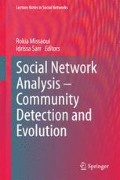Abstract
The Iranian presidential election and its post-events was the most engaging topic of the year 2009 among Twitter users. In this paper, we study the social network among the users that were engaged in that topic during an 18 month period of observation. We analyze the content of tweets that were published in English or Persian by Iranian people or others around the world and extract the most trending topics in critical days. We also study the sub-communities.
Access this chapter
Tax calculation will be finalised at checkout
Purchases are for personal use only
Notes
- 1.
Down Time Rescheduled. The official Twitter blog. [online] http://blog.twitter.com/2009/06/down-time-rescheduled.html.
- 2.
Launching Facebook in Persian. The Official Facebook Blog. [online] http://www.facebook.com/blog.php?post=97122772130.
- 3.
Google translates Persian. The official Google Blog. [online] http://googleblog.blogspot.com/2009/06/google-translates-persian.html.
- 4.
Top Twitter Trends of 2009. The Official Twitter Blog. [online] http://blog.twitter.com/2009/12/top-twitter-trends-of-2009.html.
- 5.
A corpus is a collection of documents.
- 6.
References
Adamic LA, Glance N (2005) The political blogosphere and the 2004 US election: divided they blog. In: Proceedings of the 3rd international workshop on link discovery. ACM, pp 36–43
Albrecht S, Lübcke M, Hartig-Perschke R (2007) Weblog campaigning in the German bundestag election 2005. Soc Sci Comput Rev 25(4):504–520
Bastian M, Heymann S, Jacomy M et al (2009) Gephi: an open source software for exploring and manipulating networks. ICWSM 8:361–362
Drezner DW, Farrell H (2008) Introduction: blogs, politics and power: a special issue of public choice. Public Choice 134(1–2):1–13
Jacomy M, Heymann S, Venturini T, Bastian M (2011) Forceatlas2, a graph layout algorithm for handy network visualization. Paris, p 44. http://www.medialab.sciences-po.fr/fr/publications-fr
Jones KS (1972) A statistical interpretation of term specificity and its application in retrieval. J Doc 28(1):11–21
Kelly J, Etling B (2008) Mapping Iran’s online public: politics and culture in the persian blogosphere. Berkman center for internet and society and internet and democracy project. Harvard Law School
Ketabchi K, Asadpour M, Tabatabaei SA (2013) Mutual influence of Twitter and postelection events of Iranian presidential election. Procedia-Soc Behav Sci 100:40–56
Khonsari KK, Nayeri ZA, Fathalian A, Fathalian L (2010) Social network analysis of Iran’s green movement opposition groups using Twitter. In: 2010 International conference on advances in social networks analysis and mining (ASONAM). IEEE, pp 414–415
Koop R, Jansen HJ (2009) Political blogs and blogrolls in canada: forums for democratic deliberation? Soc Sci Comput Rev 27(2):155–173
McKenna L, Pole A (2008) What do bloggers do: an average day on an average political blog. Public Choice 134(1–2):97–108
Qazvinian V, Rassoulian A, Shafiei M, Adibi J (2007) A large-scale study on persian weblogs. In: Proceedings of LINKKDD
Tumasjan A, Sprenger TO, Sandner PG, Welpe IM (2010) Predicting elections with Twitter: What 140 characters reveal about political sentiment. ICWSM 10:178–185
Zhou Z, Bandari R, Kong J, Qian H, Roychowdhury V (2010) Information resonance on Twitter: watching Iran. In: Proceedings of the first workshop on social media analytics. ACM, pp 123–131
Acknowledgments
We would like to thank Kaveh Ketabchi for his helps on collecting the dataset.
Author information
Authors and Affiliations
Corresponding author
Editor information
Editors and Affiliations
Rights and permissions
Copyright information
© 2014 Springer International Publishing Switzerland
About this chapter
Cite this chapter
Tabatabaei, S.A., Asadpour, M. (2014). Study of Influential Trends, Communities, and Websites on the Post-election Events of Iranian Presidential Election in Twitter. In: Missaoui, R., Sarr, I. (eds) Social Network Analysis - Community Detection and Evolution. Lecture Notes in Social Networks. Springer, Cham. https://doi.org/10.1007/978-3-319-12188-8_4
Download citation
DOI: https://doi.org/10.1007/978-3-319-12188-8_4
Published:
Publisher Name: Springer, Cham
Print ISBN: 978-3-319-12187-1
Online ISBN: 978-3-319-12188-8
eBook Packages: Computer ScienceComputer Science (R0)

